Unit 3 I'm more outgoing than my sister. Section A Grammar Focus—3c课件(37张PPT)
文档属性
| 名称 | Unit 3 I'm more outgoing than my sister. Section A Grammar Focus—3c课件(37张PPT) | 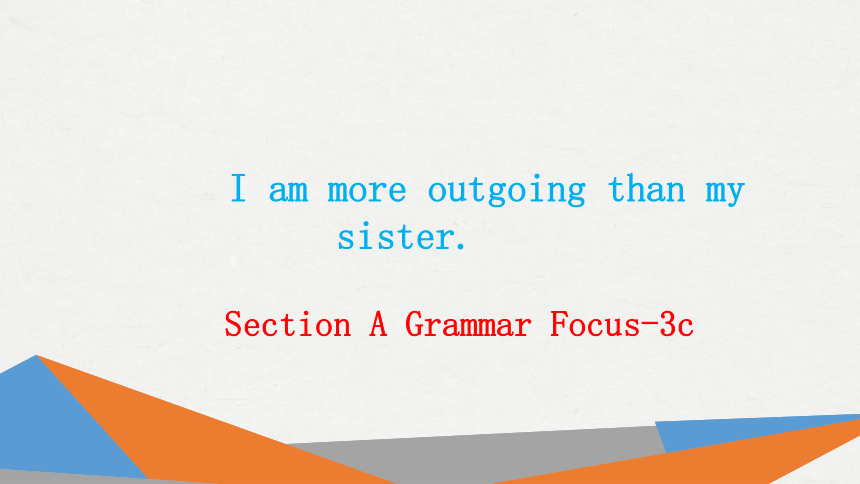 | |
| 格式 | pptx | ||
| 文件大小 | 6.0MB | ||
| 资源类型 | 教案 | ||
| 版本资源 | 人教新目标(Go for it)版 | ||
| 科目 | 英语 | ||
| 更新时间 | 2023-09-26 22:24:28 | ||
图片预览

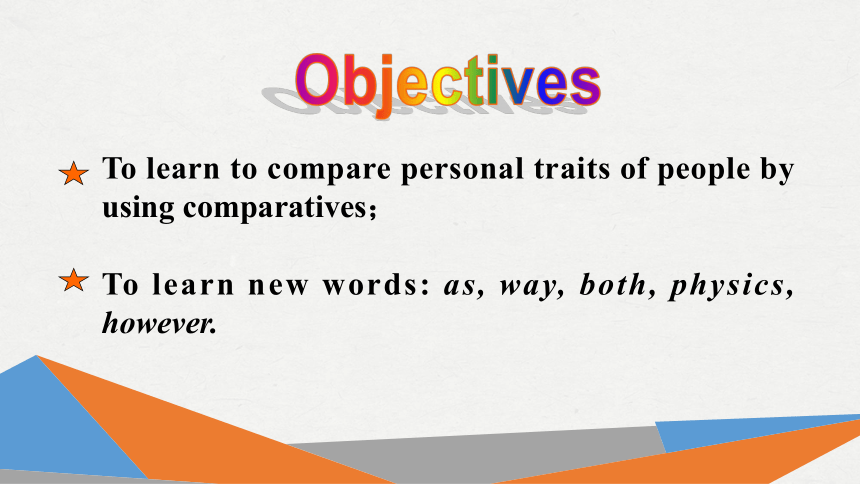
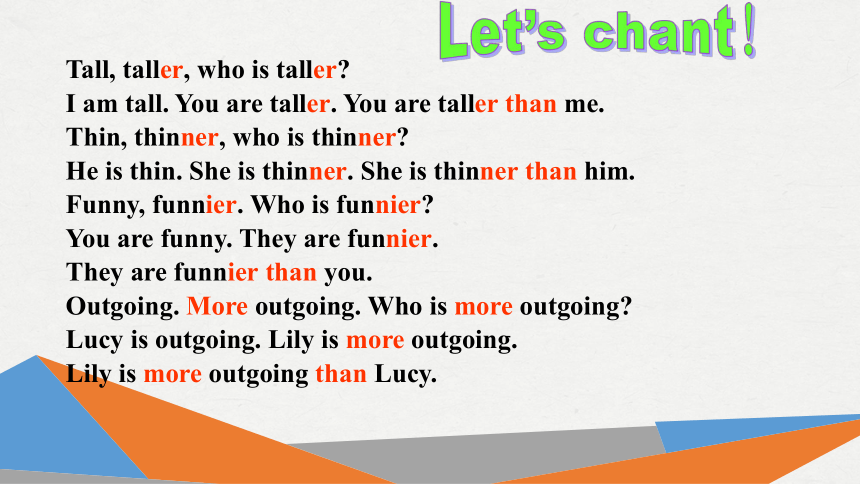
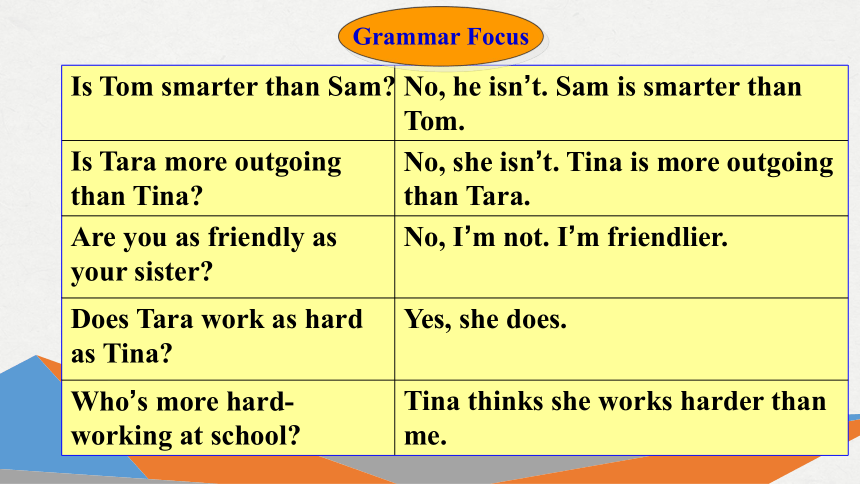
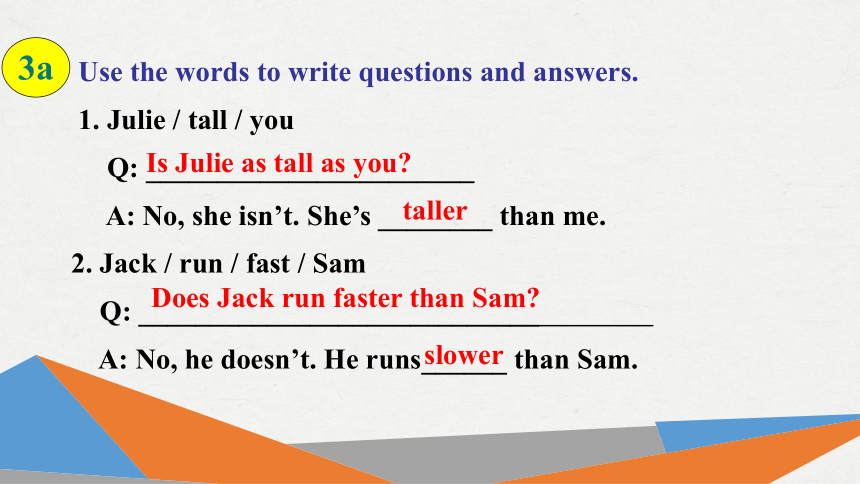
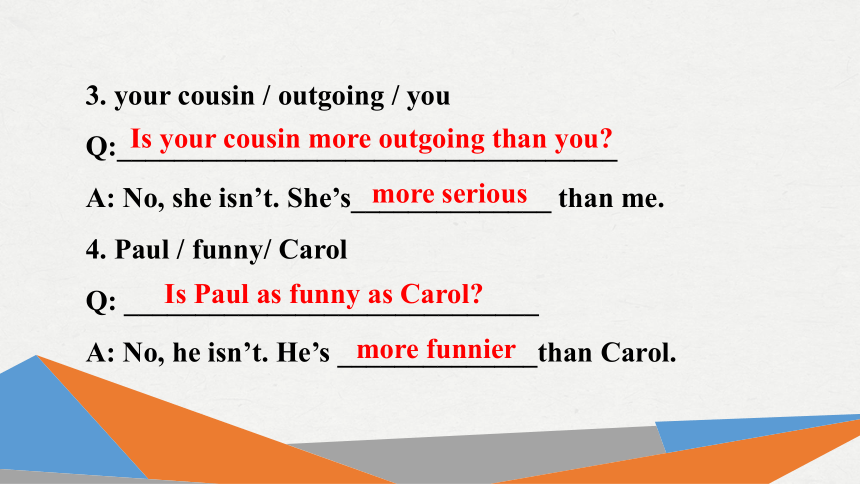
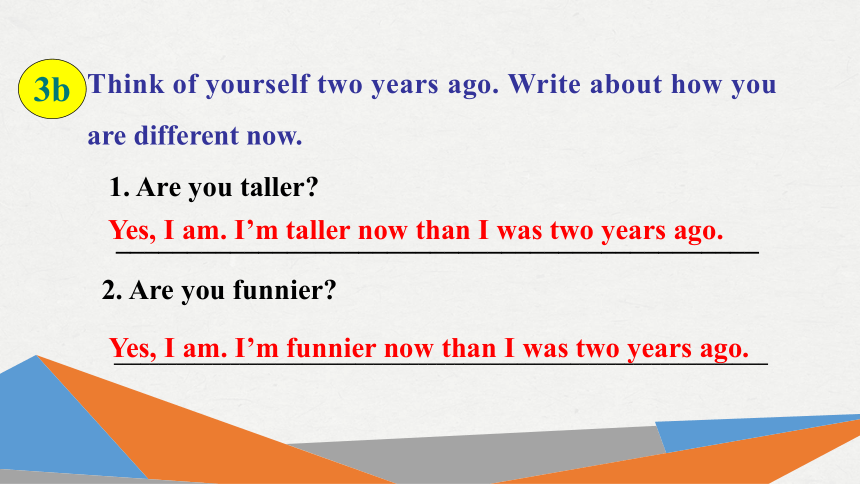
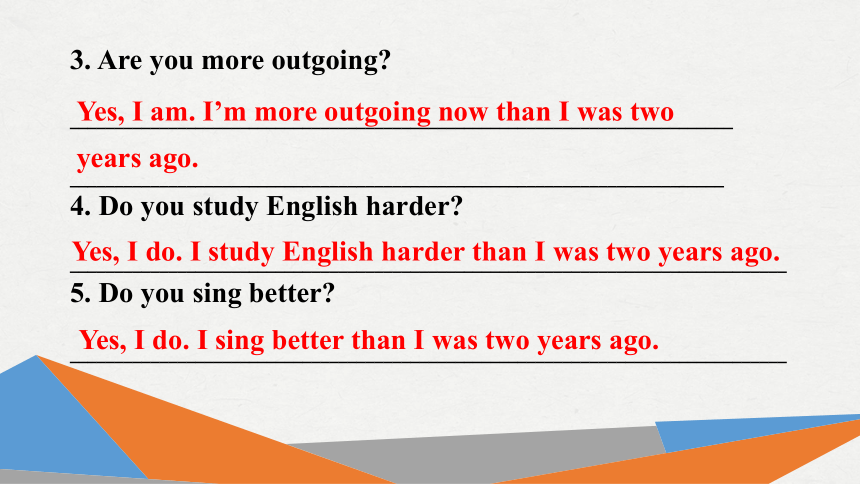
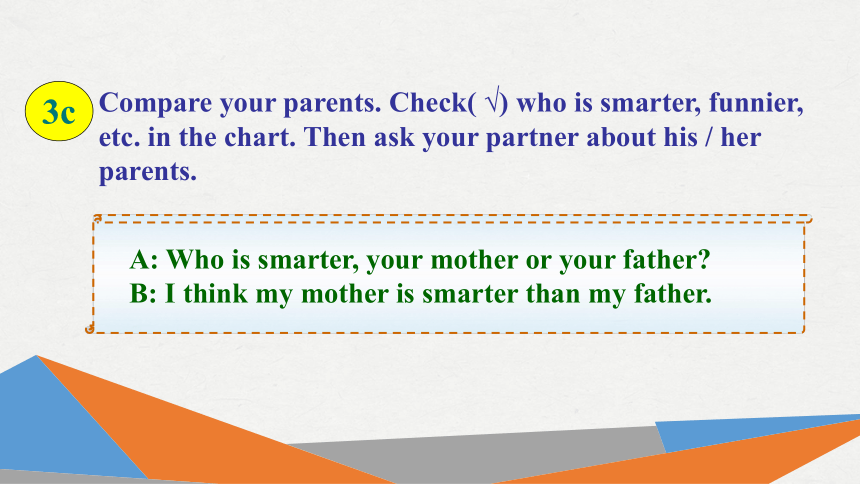
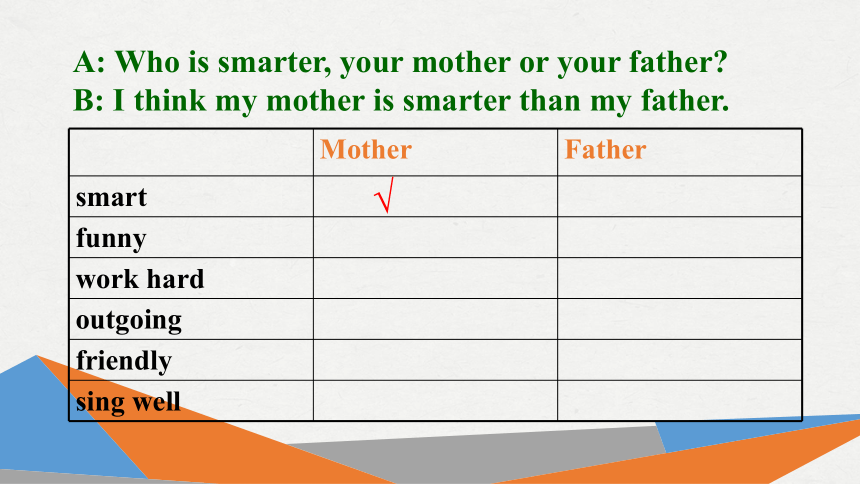
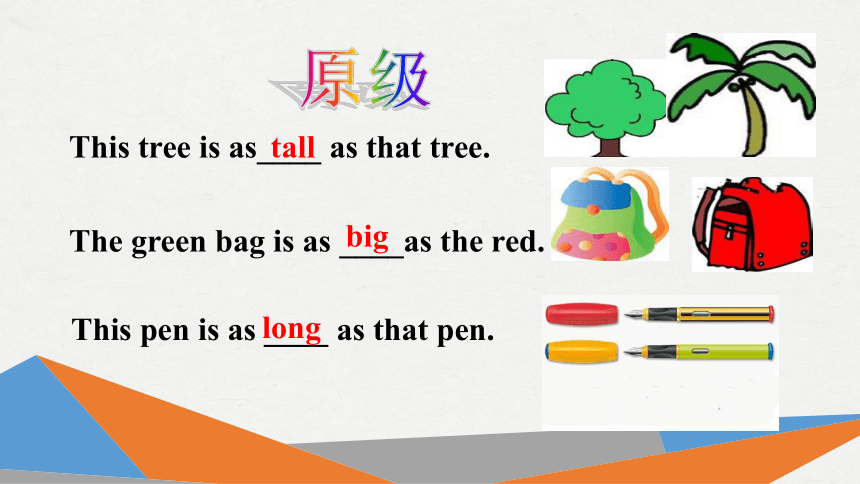
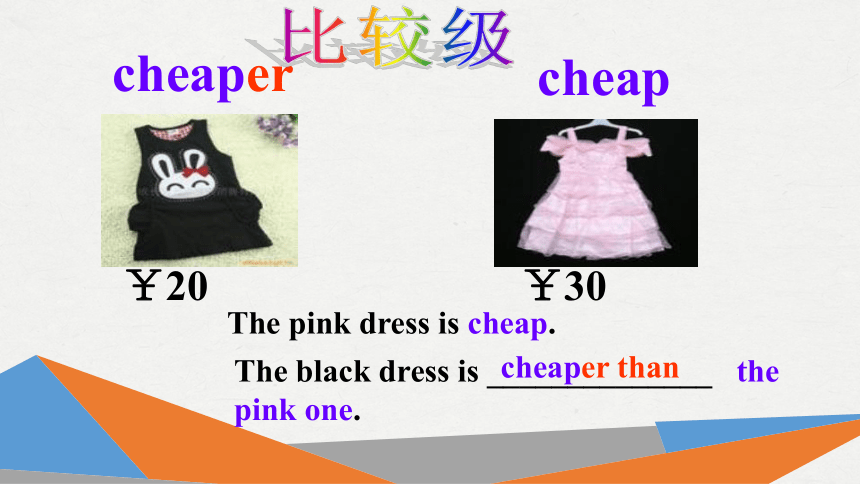
文档简介
(共37张PPT)
I am more outgoing than my sister.
Section A Grammar Focus-3c
Objectives
To learn to compare personal traits of people by using comparatives;
To learn new words: as, way, both, physics, however.
Tall, taller, who is taller
I am tall. You are taller. You are taller than me.
Thin, thinner, who is thinner
He is thin. She is thinner. She is thinner than him.
Funny, funnier. Who is funnier
You are funny. They are funnier.
They are funnier than you.
Outgoing. More outgoing. Who is more outgoing
Lucy is outgoing. Lily is more outgoing.
Lily is more outgoing than Lucy.
Let’s chant!
Is Tom smarter than Sam No, he isn’t. Sam is smarter than Tom.
Is Tara more outgoing than Tina No, she isn’t. Tina is more outgoing than Tara.
Are you as friendly as your sister No, I’m not. I’m friendlier.
Does Tara work as hard as Tina Yes, she does.
Who’s more hard-working at school Tina thinks she works harder than me.
Grammar Focus
Use the words to write questions and answers.
1. Julie / tall / you
Q: _______________________
A: No, she isn’t. She’s ________ than me.
2. Jack / run / fast / Sam
Q: ____________________________
A: No, he doesn’t. He runs______ than Sam.
Is Julie as tall as you
taller
Does Jack run faster than Sam
slower
3a
3. your cousin / outgoing / you
Q:___________________________________
A: No, she isn’t. She’s______________ than me.
4. Paul / funny/ Carol
Q: _____________________________
A: No, he isn’t. He’s ______________than Carol.
Is your cousin more outgoing than you
more serious
Is Paul as funny as Carol
more funnier
Think of yourself two years ago. Write about how you are different now.
1. Are you taller
_____________________________________________
2. Are you funnier
_________________________________________________________________________
Yes, I am. I’m taller now than I was two years ago.
Yes, I am. I’m funnier now than I was two years ago.
3b
3. Are you more outgoing
__________________________________________________________________________
_________________________________________________________________________
4. Do you study English harder
________________________________________________________________________________
5. Do you sing better
________________________________________________________________________________
Yes, I am. I’m more outgoing now than I was two years ago.
Yes, I do. I sing better than I was two years ago.
Yes, I do. I study English harder than I was two years ago.
Compare your parents. Check( √) who is smarter, funnier,
etc. in the chart. Then ask your partner about his / her
parents.
A: Who is smarter, your mother or your father
B: I think my mother is smarter than my father.
3c
A: Who is smarter, your mother or your father
B: I think my mother is smarter than my father.
Mother Father
smart
funny
work hard
outgoing
friendly
sing well
√
This tree is as____ as that tree.
The green bag is as ____as the red.
This pen is as ____ as that pen.
tall
big
long
原级
¥20
¥30
cheap
cheaper
The pink dress is cheap.
The black dress is ______________ the pink one.
cheaper than
比较级
The red car is cute.
The blue car______________ the red car.
(蓝车比红车更可爱)
is cuter than
The red apple is big.
The green apple is ________________the red one.
bigger than
56.1kg
heavy
58kg
Garfield is heavy.
Doraemon is ____________ Garfield.
heavier
heavier than
Garfield
Doraemon
short
-
shorter
small
-
smaller
nice
nicer
safe
safer
-
-
-
-
-
-
big
thin
heavy
heavier
happy
happier
找规律:
big
bigger
thin
thinner
规则变化:
1)单音节词和少数双音节词一般在词尾后加-er 构成比较级 或-est构成
最高级。 如:
原级 比较级 最高级
cold –—— colder –—— coldest
bright——— brighter———brightest
young—— younger—— youngest
2) 以字母 e 结尾的词只加 –r 或-st 构成比较级和最高级。
原级 比较级 最高级
nice ——— nicer –——— nicest
fine——— finer———— finest
large —— larger ———— largest
3) 重读闭音节词末尾只有一个辅音字母时, 先双写这个辅音
字母, 再加-er或-est。
如: big – bigger – biggest
thin – thinner – thinnest
4) 以“辅音字母+ y”结尾的双音节词,先改y为i, 再加-er或
-est。如:
easy – easier – easiest
happy – happier – happiest
5) 多音节词和部分双音节词在词前加more或most。如:
delicious – more delicious
– most delicious
interesting – more interesting
– most interesting
important—more important
—most important
不规则变化:
e.g. good / well – better – best
bad / badly – worse – worst
many / much – more – most
little – less – least
far – farther / further – farthest/ furthest
讲述某人或某物自身情况时用原级。
基本句型:主语+ 谓语 + 形容词/副词原级 +….
He is very old now. 他现在很老了。
They ran quite fast. 它们跑得相当快。
The weather looks rather bad. 天气看上去相当糟。
I am so happy. 我是如此的快乐。
原级的用法
表示两者之间没有差别时,使用句型:
主语(第一个人物) + 谓语动词 + as + 形容词/副词原级 + as + 第二个人物 +…
e.g. He is as excited as his younger sister.
他和他妹妹一样兴奋。
Lily rode her bike as slowly as an old lady.
莉莉骑车像老太太一样慢。
They picked as many apples as the farmers (did).
他们摘的苹果和农民一样多。
表示第一个人比不上第二个人时,使用句型:
主语(第一个人物) + 谓语动词(否定式) + as / so + 形容词/副词原级 + as…
e.g. He is not so / as excited as his younger sister.
他没他妹妹那么兴奋。
Lily did not ride her bike so / as slowly as anold lady.
莉莉骑车不像老太太那样慢。
They didn’t pick so / as many apples as the farmers (did).
他们摘的苹果不如农民多。
1. 讲述两者有差异, 第一个人物超过第二个人物时用比较
级。
基本句型:主语(A)+谓语动词+形容词/副词比较级+than+主语(B)+….
e.g. A modern train is faster than a car.
现代的火车比汽车快多了。
This book didn’t cost me more than that one.
这本书花费我的钱不比那本多。
比较级的用法
2.在形容词比较级前还可用much, even, still, a little来
修饰, 表示“……的多”, “甚至……”, “更……”,
“……一些”。
e.g. 1) This city is much more beautiful than before.
2) She’s a little more outgoing than me.
3) It’s a little colder today.
3.“比较级+and+比较级”意为“越来越……” 。多音
节比较级用“more and more+形容词原级”形式。如:
It’s getting worse and worse.
The group became more and more popular.
4. “Which / Who is + 比较级…?”
比较A、B两事物, 问其中哪一个较……时用此句型。如:
Which T-shirt is nicer, this one or that one
Who is more active, Mary or Kate
Which one is more popular among students, going to
concerts or going to movies
5. 使用形容词比较级时需注意以下几点:
than后面接代词时, 一般要用主格形式, 但在口语中也可使用
宾格形式。 如:
My brother is taller than I/me.
2) 当需要表示一方超过另一方的程度时,可以用much, a lot, a little,
a bit, even, still等来修饰形容词比较级。
注意: 比较级不能用very, so, too, quite等修饰。如:
He is much more serious than Sam.
3) 形容词比较级后面往往用连词than连接另一个比较的人或事物,
但在上下文明确的情况下, 形容词比较级可单独使用。如:
My sister is tall, but my aunt is taller.
我姐姐个子高, 但我姑姑个子更高。
4) 进行比较的人和物必须是同一类。
My books are more than yours.
I have more books than you.
Let’s do exercises.
词汇
1. I’m tall but my sister is ________(short).
2. My mother has long hair, and my sister has_______ (long) hair.
3.This little baby is ______________(outgoing) than that one.
shorter
longer
more outgoing
4. In some ways we look the same, in some ways we look __________
(不同).
5. Ann is a very ____________(安静的) girl, she hardly makes noise.
different
quiet
1. The twins ______ lovely girls.
A. are all B. are both C. both are
2. I like drawing and I am good _____ it.
A. in B. on C. at
3. That box is _______ than others.
A. more heavier B. heavy C. much heavier
单项选择
B
C
C
4. She is three years _______ than I am.
A. old B. more old C. older
5. I think a good friend should make me ____.
A. laugh B. laughing C. to laugh
6. Lucy is very short, but she is ___ than her sister.
A. shorter B. longer
C. taller D. older
C
A
C
7. Frank is ____ friendly than his brother.
A. a little more B. a few more
C. much D. a little
8. Sam is ____at Chinese than Jim.
A. good B. well
C. better D. gooder
A
C
For example:
I was shorter and more outgoing … But now, I am taller and …
Say something about your past and now.
THANKS
I am more outgoing than my sister.
Section A Grammar Focus-3c
Objectives
To learn to compare personal traits of people by using comparatives;
To learn new words: as, way, both, physics, however.
Tall, taller, who is taller
I am tall. You are taller. You are taller than me.
Thin, thinner, who is thinner
He is thin. She is thinner. She is thinner than him.
Funny, funnier. Who is funnier
You are funny. They are funnier.
They are funnier than you.
Outgoing. More outgoing. Who is more outgoing
Lucy is outgoing. Lily is more outgoing.
Lily is more outgoing than Lucy.
Let’s chant!
Is Tom smarter than Sam No, he isn’t. Sam is smarter than Tom.
Is Tara more outgoing than Tina No, she isn’t. Tina is more outgoing than Tara.
Are you as friendly as your sister No, I’m not. I’m friendlier.
Does Tara work as hard as Tina Yes, she does.
Who’s more hard-working at school Tina thinks she works harder than me.
Grammar Focus
Use the words to write questions and answers.
1. Julie / tall / you
Q: _______________________
A: No, she isn’t. She’s ________ than me.
2. Jack / run / fast / Sam
Q: ____________________________
A: No, he doesn’t. He runs______ than Sam.
Is Julie as tall as you
taller
Does Jack run faster than Sam
slower
3a
3. your cousin / outgoing / you
Q:___________________________________
A: No, she isn’t. She’s______________ than me.
4. Paul / funny/ Carol
Q: _____________________________
A: No, he isn’t. He’s ______________than Carol.
Is your cousin more outgoing than you
more serious
Is Paul as funny as Carol
more funnier
Think of yourself two years ago. Write about how you are different now.
1. Are you taller
_____________________________________________
2. Are you funnier
_________________________________________________________________________
Yes, I am. I’m taller now than I was two years ago.
Yes, I am. I’m funnier now than I was two years ago.
3b
3. Are you more outgoing
__________________________________________________________________________
_________________________________________________________________________
4. Do you study English harder
________________________________________________________________________________
5. Do you sing better
________________________________________________________________________________
Yes, I am. I’m more outgoing now than I was two years ago.
Yes, I do. I sing better than I was two years ago.
Yes, I do. I study English harder than I was two years ago.
Compare your parents. Check( √) who is smarter, funnier,
etc. in the chart. Then ask your partner about his / her
parents.
A: Who is smarter, your mother or your father
B: I think my mother is smarter than my father.
3c
A: Who is smarter, your mother or your father
B: I think my mother is smarter than my father.
Mother Father
smart
funny
work hard
outgoing
friendly
sing well
√
This tree is as____ as that tree.
The green bag is as ____as the red.
This pen is as ____ as that pen.
tall
big
long
原级
¥20
¥30
cheap
cheaper
The pink dress is cheap.
The black dress is ______________ the pink one.
cheaper than
比较级
The red car is cute.
The blue car______________ the red car.
(蓝车比红车更可爱)
is cuter than
The red apple is big.
The green apple is ________________the red one.
bigger than
56.1kg
heavy
58kg
Garfield is heavy.
Doraemon is ____________ Garfield.
heavier
heavier than
Garfield
Doraemon
short
-
shorter
small
-
smaller
nice
nicer
safe
safer
-
-
-
-
-
-
big
thin
heavy
heavier
happy
happier
找规律:
big
bigger
thin
thinner
规则变化:
1)单音节词和少数双音节词一般在词尾后加-er 构成比较级 或-est构成
最高级。 如:
原级 比较级 最高级
cold –—— colder –—— coldest
bright——— brighter———brightest
young—— younger—— youngest
2) 以字母 e 结尾的词只加 –r 或-st 构成比较级和最高级。
原级 比较级 最高级
nice ——— nicer –——— nicest
fine——— finer———— finest
large —— larger ———— largest
3) 重读闭音节词末尾只有一个辅音字母时, 先双写这个辅音
字母, 再加-er或-est。
如: big – bigger – biggest
thin – thinner – thinnest
4) 以“辅音字母+ y”结尾的双音节词,先改y为i, 再加-er或
-est。如:
easy – easier – easiest
happy – happier – happiest
5) 多音节词和部分双音节词在词前加more或most。如:
delicious – more delicious
– most delicious
interesting – more interesting
– most interesting
important—more important
—most important
不规则变化:
e.g. good / well – better – best
bad / badly – worse – worst
many / much – more – most
little – less – least
far – farther / further – farthest/ furthest
讲述某人或某物自身情况时用原级。
基本句型:主语+ 谓语 + 形容词/副词原级 +….
He is very old now. 他现在很老了。
They ran quite fast. 它们跑得相当快。
The weather looks rather bad. 天气看上去相当糟。
I am so happy. 我是如此的快乐。
原级的用法
表示两者之间没有差别时,使用句型:
主语(第一个人物) + 谓语动词 + as + 形容词/副词原级 + as + 第二个人物 +…
e.g. He is as excited as his younger sister.
他和他妹妹一样兴奋。
Lily rode her bike as slowly as an old lady.
莉莉骑车像老太太一样慢。
They picked as many apples as the farmers (did).
他们摘的苹果和农民一样多。
表示第一个人比不上第二个人时,使用句型:
主语(第一个人物) + 谓语动词(否定式) + as / so + 形容词/副词原级 + as…
e.g. He is not so / as excited as his younger sister.
他没他妹妹那么兴奋。
Lily did not ride her bike so / as slowly as anold lady.
莉莉骑车不像老太太那样慢。
They didn’t pick so / as many apples as the farmers (did).
他们摘的苹果不如农民多。
1. 讲述两者有差异, 第一个人物超过第二个人物时用比较
级。
基本句型:主语(A)+谓语动词+形容词/副词比较级+than+主语(B)+….
e.g. A modern train is faster than a car.
现代的火车比汽车快多了。
This book didn’t cost me more than that one.
这本书花费我的钱不比那本多。
比较级的用法
2.在形容词比较级前还可用much, even, still, a little来
修饰, 表示“……的多”, “甚至……”, “更……”,
“……一些”。
e.g. 1) This city is much more beautiful than before.
2) She’s a little more outgoing than me.
3) It’s a little colder today.
3.“比较级+and+比较级”意为“越来越……” 。多音
节比较级用“more and more+形容词原级”形式。如:
It’s getting worse and worse.
The group became more and more popular.
4. “Which / Who is + 比较级…?”
比较A、B两事物, 问其中哪一个较……时用此句型。如:
Which T-shirt is nicer, this one or that one
Who is more active, Mary or Kate
Which one is more popular among students, going to
concerts or going to movies
5. 使用形容词比较级时需注意以下几点:
than后面接代词时, 一般要用主格形式, 但在口语中也可使用
宾格形式。 如:
My brother is taller than I/me.
2) 当需要表示一方超过另一方的程度时,可以用much, a lot, a little,
a bit, even, still等来修饰形容词比较级。
注意: 比较级不能用very, so, too, quite等修饰。如:
He is much more serious than Sam.
3) 形容词比较级后面往往用连词than连接另一个比较的人或事物,
但在上下文明确的情况下, 形容词比较级可单独使用。如:
My sister is tall, but my aunt is taller.
我姐姐个子高, 但我姑姑个子更高。
4) 进行比较的人和物必须是同一类。
My books are more than yours.
I have more books than you.
Let’s do exercises.
词汇
1. I’m tall but my sister is ________(short).
2. My mother has long hair, and my sister has_______ (long) hair.
3.This little baby is ______________(outgoing) than that one.
shorter
longer
more outgoing
4. In some ways we look the same, in some ways we look __________
(不同).
5. Ann is a very ____________(安静的) girl, she hardly makes noise.
different
quiet
1. The twins ______ lovely girls.
A. are all B. are both C. both are
2. I like drawing and I am good _____ it.
A. in B. on C. at
3. That box is _______ than others.
A. more heavier B. heavy C. much heavier
单项选择
B
C
C
4. She is three years _______ than I am.
A. old B. more old C. older
5. I think a good friend should make me ____.
A. laugh B. laughing C. to laugh
6. Lucy is very short, but she is ___ than her sister.
A. shorter B. longer
C. taller D. older
C
A
C
7. Frank is ____ friendly than his brother.
A. a little more B. a few more
C. much D. a little
8. Sam is ____at Chinese than Jim.
A. good B. well
C. better D. gooder
A
C
For example:
I was shorter and more outgoing … But now, I am taller and …
Say something about your past and now.
THANKS
同课章节目录
- Unit 1 Where did you go on vacation?
- Section A
- Section B
- Unit 2 How often do you exercise?
- Section A
- Section B
- Unit 3 I'm more outgoing than my sister.
- Section A
- Section B
- Unit 4 What's the best movie theater?
- Section A
- Section B
- Unit 5 Do you want to watch a game show?
- Section A
- Section B
- Unit 6 I'm going to study computer science.
- Section A
- Section B
- Unit 7 Will people have robots?
- Section A
- Section B
- Unit 8 How do you make a banana milk shake?
- Section A
- Section B
- Unit 9 Can you come to my party?
- Section A
- Section B
- Unit 10 If you go to the party, you'll have a grea
- Section A
- Section B
